#soviet composers
Text
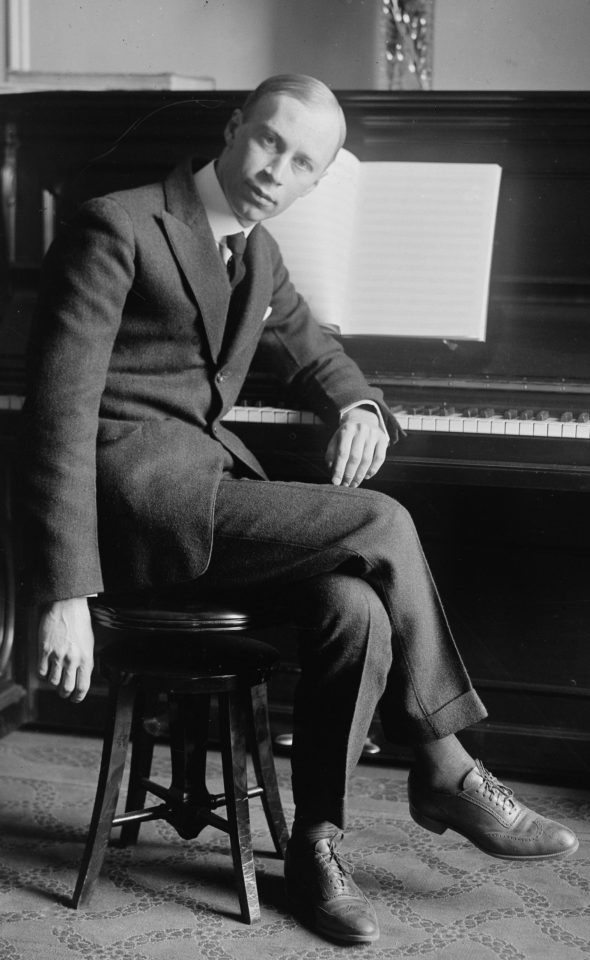
Sergei Prokofiev
(27 April 1891 - 5 March 1953)
Happy Birthday, Sergei!
#prokofiev#sergei prokofiev#soviet composers#classical music#20th century music#modernism#modern music#happy birthday#composer birthday
41 notes
·
View notes
Text
Dmitri Shostakovich at Sergei Prokofiev's funeral, 1953.

For context, Prokofiev and Stalin died on the same day- March 5, 1953. Because Stalin's funeral was such a major event in the Soviet Union, Prokofiev's was largely overlooked, despite the fact he was one of the leading Soviet composers of his day. Relatively few people attended his funeral, Shostakovich among them.
Shostakovich and Prokofiev were not particularly close, and had a thorny professional relationship- much of the correspondence between them that I've been able to find appears to be formal criticism of each other's works. As Prokofiev was from an older generation- he was born in 1891, while Shostakovich was born in 1906- they did not always see eye-to-eye musically; Shostakovich experimented with the avant-garde when possible, perhaps in part due to his musical maturation during the socially-liberal NEP era, while Prokofiev's style tended to be more conservative and neoclassical- picking up more influence from Imperial-age composers and fellow emigres to the west (he lived in France and the United States before returning to the Soviet Union in 1936). Their generational difference also partially accounted for how they responded to harsh government criticism- Shostakovich was impacted by the consequences of his 1936 denunciation all his life and, while he suffered greatly during his second denunciation in 1948, was able to develop public and private personas, in both the musical and ideological spheres, to preserve himself and his artistry. However devastating as it was for Shostakovich, the 1948 denunciations took a greater toll on many other composers, Prokofiev included. As Prokofiev did not believe he would be harshly denounced as Shostakovich had been in 1936, he was far less prepared for the censorship and attacks he faced in 1948. As a result of the denunciations, combined with his declining health, his artistic productivity decreased, and he largely regulated himself to writing basic ideological works towards the end of his life.
This is a letter Shostakovich wrote to Prokofiev on the subject of his Seventh (and last) Symphony:
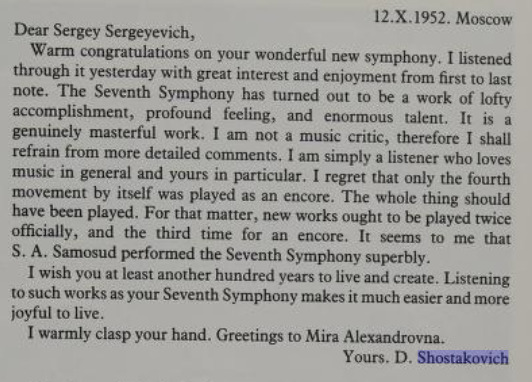
There's speculation as to whether or not Shostakovich was actually impressed by Prokofiev's Seventh Symphony. As Prokofiev was in decline at the time of writing it, the symphony has been criticized for being banal and not being particularly innovative; Rostropovich even claimed that Prokofiev added in its final flourish not for artistic purposes, but to have the piece nominated for a Stalin Prize, which would have meant money and a boost to his reputation after it suffered in 1948. (The Stalin Prize has its own complicated history in its role in Soviet music, and although it was the highest award a Soviet composer could earn, it could sometimes be awarded as a sort of backhanded punishment- an encouragement for composers to write the "right" sort of music, especially after they had been criticized for "formalism." Nonetheless, winning it after suffering a denunciation could mean financial and political security.) Did Shostakovich- who had often traded criticisms with Prokofiev over music- actually like this piece, or was this an effort to encourage a fellow artist to keep composing after suffering mental and physical ailments? This was a private letter and not a public statement, and Shostakovich was typically very straightforward about critiques, so if the entirely positive sentiment for the piece wasn't genuine (the only critique here is that Shostakovich says he wishes the entire symphony was encored!), the letter may have come from a place of concern.
Perhaps the most striking thing about this letter is the line, "I wish you another hundred years to live and create. Listening to such works as your Seventh Symphony makes it much easier and more joyful to live." Maybe by telling Prokofiev that he wished him another hundred years to live and create, Shostakovich was not simply praising the symphony, but encouraging Prokofiev- a composer whom he was often on icy terms with- that he needed to keep living and creating, during a time when it was becoming more and more difficult for him to do so.
#shostakovich#dmitri shostakovich#prokofiev#sergei prokofiev#music history#composers#classical composers#history#soviet history#classical music#music#cw dead body
228 notes
·
View notes
Text
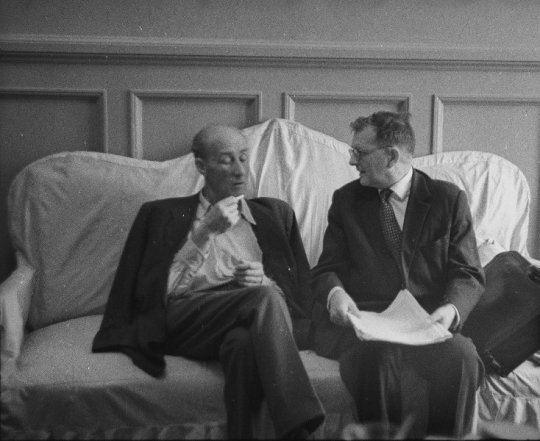
Evgeny Mravinsky and Dmitry Shostakovich, 1961
45 notes
·
View notes
Text
This was originally a request from a friend but I figured I might as well post here coz I think it’s too funny
Audio: Berlioz, Symphonie Fantastique Mvt. 4. March to the Scaffold
Would highly recommend listening to the whole track coz it’s a banger but also it’s literally the composer having an opium-induced fever dream about him getting his head lopped off at the guillotine so
#genshin impact#focalors#neuvillette#I’m not sorry#this whole thing spawned from me ranting about Fontaine’s OST for like the nth time#for context I’m a classical musician and while I don’t think Fontaine’s music is necessarily bad#and I get what Hoyomix was aiming for#the direction they chose just frustrates me so much that I could probably scream about it for a good ten minutes or so#again not saying Hoyomix is bad I love their stuff too it just#FRSUTRATES ME#that the nation primarily inspired by what I’m assuming is Belle epoque France#fails to capitalise off of using French romantic composers from the era#and yes I know they said they’ve used Saint-Saëns#Ravel and Faure but I can’t hear it outside of the original Travail motif which was repurposed to just Arlecchino’s#and no imitation compositional technique isn’t making it super obvious either#but somehow we get a lot of Russian and Soviet composers#and I LOVE their stuff#but I was expecting Shostakovich and Stravinsky for SNEZHNAYA NOT FONTAINE#and also Khachaturian while we’re at it#SERIOUSLY WHY IS THERE A SUPER STRAVINSKY SOUNDNING TRACK IN SOME FRENCH CAVES#for reference the track is Magick Without Tears#I mean if we got Chopin at least question mark#but the dude is still Polish and famously homesick despite living in France#but seriously how did we get fricking Le Mer referenced in INAZUMA BUT NOT FONTAINE#no track names alluding to Debussy’s famous works don’t count either we could’ve had La Cathedral Engloutie underwater or something likE#IMAGINE#*cathedrale oops#and don’t get me started on how one of the few references I can find to French Impressionism is just Satie’s gymnopedie#and they named it Gymnopedie too LIKE#or any reference in the OST to the operas in Furina’s constellations like those are som serious bangers
11 notes
·
View notes
Text
youtube
Dmitry Kabalevsky (1904-1987) - Piano Sonata No. 3 in F Major, Op. 46
0:00 Allegro con moto 5:11 Andante cantabile 10:48 Allegro giocoso
Artur Pizarro, pf
6 notes
·
View notes
Text
Brought to tears by a Shostakovich string quartet yet again
#shostakovich#classical music#string instruments#string quartet#western art music#western art#russian composers#russian music#soviet music#Soviet composer#mine
8 notes
·
View notes
Video
youtube
spending my evening listening to Ukrainian songs of 60′s and 70's and got mesmerized by this masterpiece again. it’s called “A Song Will Be among Us” - written and performed by Volodymyr Ivasiuk, 1971.
Do not hide the blue ray of your eyes,
Sing to me one last time.
I will take that song as a memory,
This song will be among Us
#another beautiful soul killed by soviet regime#ukraine 🇺🇦#ukrainian music#volodymyr ivasiuk#anz speaks#ukrainian composers#ukrainian musicians#ukrainian art
34 notes
·
View notes
Text
girl i love music so much
7 notes
·
View notes
Photo
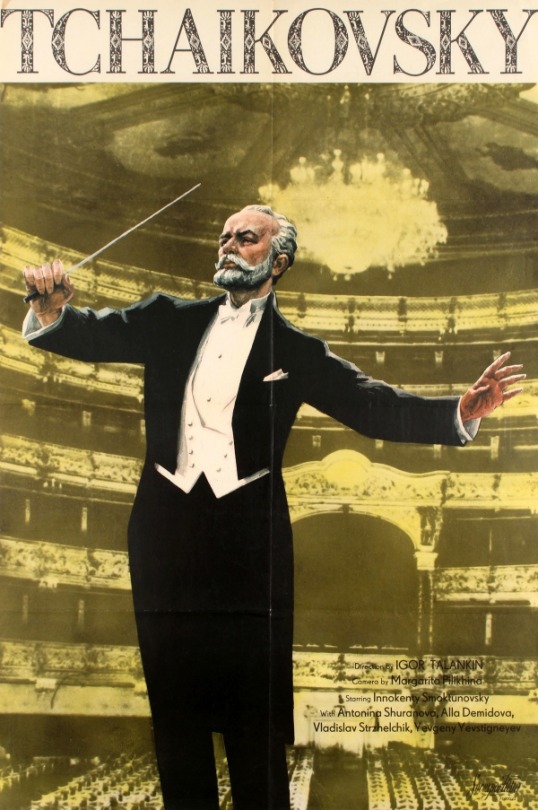
Poster for the biopic film ‘Tchaikovsky’ of the life of the Russian classical composer Pyotr Ilyich Tchaikovsky, directed by Igor Talankin (1972).
#vintage poster#1970s#vintage film poster#russian#Pyotr Ilyich Tchaikovsky#Tchaikovsky#Igor Talankin#soviet union#music#classical music#composer#conductor
141 notes
·
View notes
Text
there are quite a few youtube videos of shostakovich's second waltz set to various pictures/paintings of the russian royal family and their balls and like... do the people who make these videos know? i'm just wondering
#im just saying... he was very much not a composer when russia was officially an empire...#please don't tie his music to images of the russian empire#he wasnt exactly pleased with the soviet government many times but that does not mean hed enjoy the fucking russian royal family
3 notes
·
View notes
Text
okay not enough of you classical music people know about the dsch journal and that is a CRIME
so, the dsch journal is a volunteer-run journal dedicated entirely to the life and works of dmitri shostakovich. it’s been running since the 90s and publishes two journals per year, which are filled with historical interviews and letters, musical reviews and analyses, opinion pieces from fans and listeners, and updates from the world of shostakovich research on new projects and discoveries to help us better understand one of the most enigmatic- and yet, one of the most famous- composers of the 20th century. their website contains some sample articles from over the years, which often have exclusive information that can be hard to find in biographies and other publications, like interviews from shostakovich’s close friends and family. anyone from anywhere in the world can apply to submit their work to the journal, which is how I got my start with them. they also have an instagram and facebook, where they post lots of neat shostakovich photos, so you should check those out!
I’m now a volunteer writer, editor, and researcher with the dsch journal, and the opportunity has just been amazing. in the upcoming issue, I have three articles- two obituaries and a news piece on a ten-volume (!!) chronicle being released over the course of this decade documenting shostakovich’s life in intense detail, which I was SO excited to read about. I’ve also had a chance to proofread some interviews from his visit to america in 1973, which contain some fascinating information on his artistic process.
also I just gotta point out the covers of the print journals, because they are GORGEOUS. here are some of my favorites-
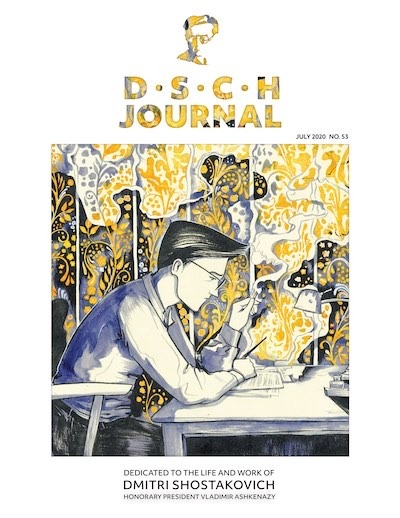

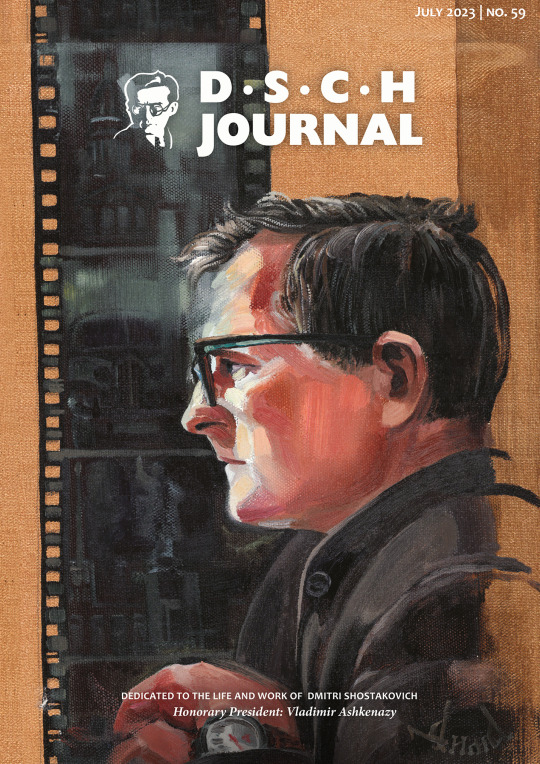
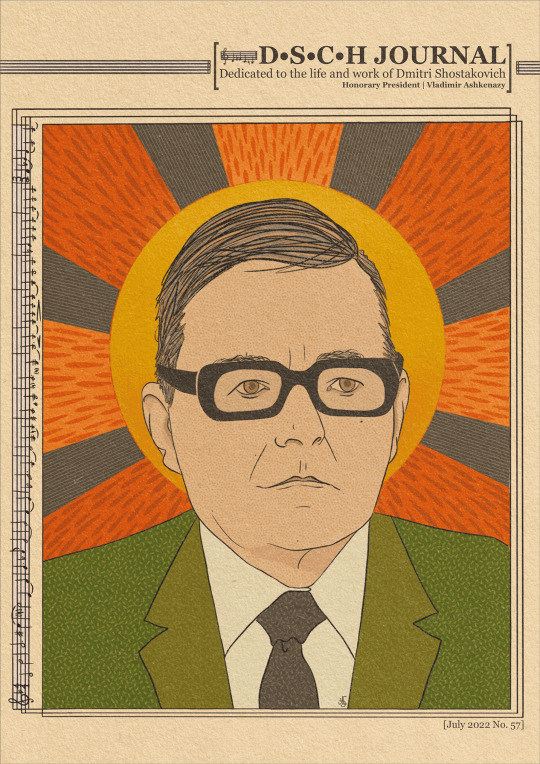
just !! look at them!!
#shostakovich#dmitri shostakovich#dsch journal#classical music#music history#soviet history#classical composer
59 notes
·
View notes
Text
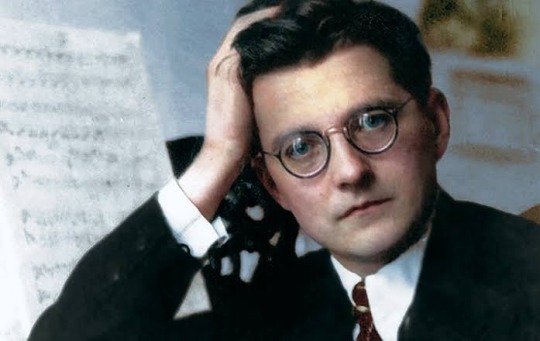
“When a man is in despair, it means he still believes in something.”
Dmitri Shostakovich
10 notes
·
View notes
Text

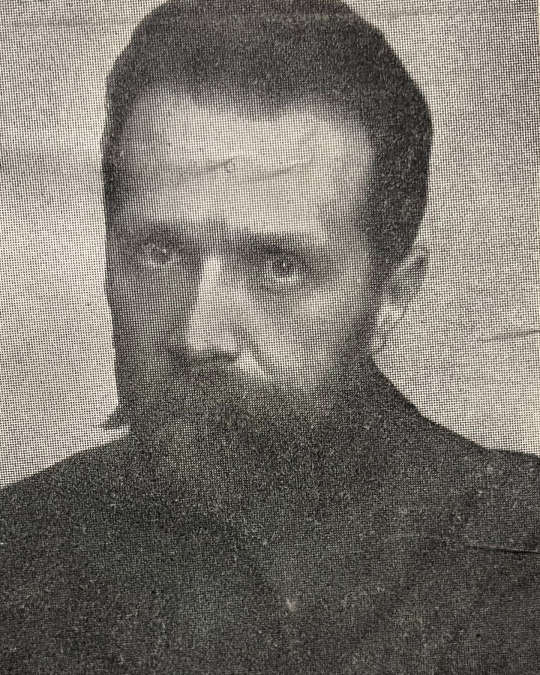

OTD in Music History: Russian-Soviet composer Nikolai Myaskovsky (1881 - 1950) is born near Modlin Fortress (present-day Poland) in what was then the Russian Empire.
Sometimes referred to as the "Father of the Soviet Symphony,” Myaskosvky was highly acclaimed in his own day. While he was awarded the Soviet Union’s highest honor – the “Stalin Prize” – five times, however, Myaskovsky always remained a rather distant and enigmatic figure. Fundamentally a conservative artist, Myaskovsky nevertheless enjoyed flirting with “modernism” from time to time; possessed of a markedly individualistic spirit, he flourished even within the decidedly collectivist atmosphere of the Stalin-Era Soviet Union.
After enrolling at the St. Petersburg Conservatory in 1906 (at the age of 25), Myaskovsky studied with Nicolai Rimsky-Korsakov (1844 - 1908) and Anatol Lyadov (1855 – 1914) and befriended the young Sergei Prokofiev (1891 - 1953), who was ten years his junior. In his third year at the Conservatory, Myaskovsky composed his Symphony No. 1 – which won him a scholarship that paid for the remainder of his schooling. After graduating in 1911, he initially supported himself by teaching private lessons before eventually securing a position at the Moscow Conservatory.
Myaskovsky rose to international prominence as a composer in the mid-1920s, and throughout the 1930s-40s he continued to churn out a long series of symphonies, piano sonatas, and string quartets. He also notably taught both Aram Khachaturian (1903 - 1978) and Dmitri Kabalevsky (1904 - 1987).
PICTURED: A small photo showing the middle-aged Myaskovsky, which he signed and dated in Moscow in 1936.
#Nikolai Myaskovsky#Myaskovsky#Mikołaj Miąskowski#classical music#music history#classical composer#composer#Father of the Soviet Symphony#classical musician#musician#music#symphony#orchestra#symphonic poem#Overture#Violin Concerto#Concerto#Concert#Dramatic Overture#Cello Concerto#Choral music#Cantata#Nocturne#Sonata#Chamber music#Piano music#Songs
3 notes
·
View notes
Text
youtube
Yuri Shaporin (1887–1966) - Ballad in G Minor for Piano, Op. 28 ·
Kirill Kozlovski, piano
2 notes
·
View notes
Video
youtube
“Manuscripts don't burn.” ― Mikhail Bulgakov, The Master and Margarita
#the master and margarita#mikhail bulgakov#bulgakov#sergey alimov#the white guard#soviet#anatoly fomenko#shostakovich#prokofiev#mussorgsky#marc chagall#chagall#gustav dore#classical music#classical composers#classics#music for reading#dark acamedia#dark academism#literature
0 notes
Text
The fact that Aziraphale chose to listen to Shostakovich among all other classical composers says a lot.
Shostakovich was one of the brightest musicians of his time in the USSR. His ideas and music had revolutionary themes and pictures repressive power of Soviet Leaders.
Back then, Soviet Union eliminated anyone who thought differently or had different opinions on how the state should be governed and how people should live in there.
Shostakovich was terrified of the government and, for a while, stopped releasing his creative music, instead keeping a low profile and went with the flow until he didn’t.
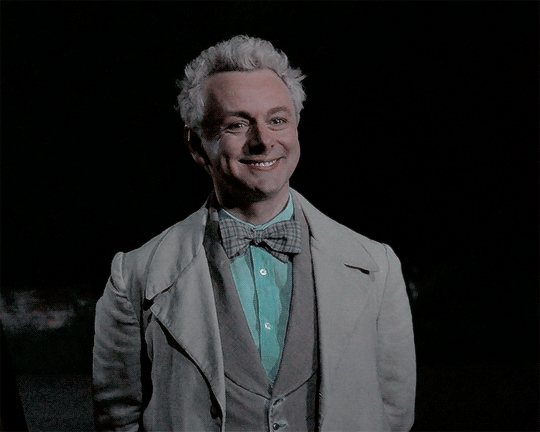
I DONT KNOW WHAT THIS BASTARD IS DOING. But I believe in him. I think he has a plan.
Aziraphale, you go, girl ✨
#good omens#ineffable husbands#aziracrow#crowley#aziraphale#good omens 2#ineffable boyfriends#david tennant#michael sheen
7K notes
·
View notes